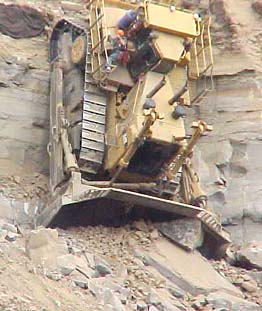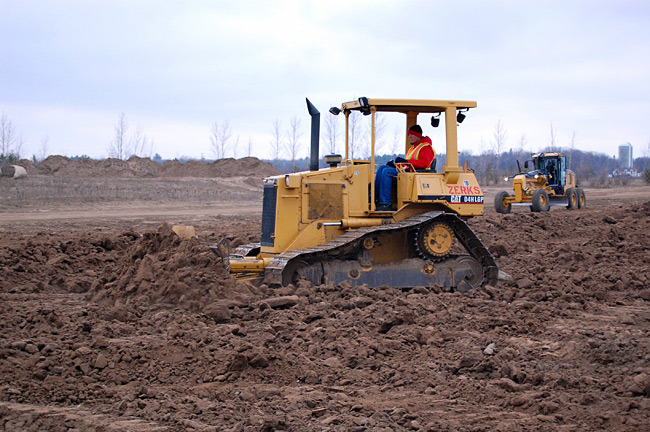Heavy Equipment Operator About
Source: (Google.com.pk)
Whether working as heavy equipment operators, mechanics, or surveyors, operating engineers can be found on any project using construction equipment. "Heavy equipment" is the blanket term for numerous types of machines: cranes, bulldozers, front end loaders, rollers, backhoes, graders, dredges, hoists, drills, pumps and compressors are just some of the equipment used by operating engineers. We are also called hoisting and portable engineers because the equipment we operate lifts and/or moves.
In most cases, if it can push, pull, pump or lift material, rolls on tires or crawls on tracks like a tank, it’s the work of IUOE. On virtually all construction projects, operating engineers are the first workers on the job and the last to leave. Our work is essential to a smooth-running construction project.
Although many members have a favorite type of machine to operate, operating engineers are masters of a variety of equipment. This versatility keeps us employable because employers' needs vary from project to project.
Heavy equipment mechanics and surveyors also are very important contributors on any construction job. Mechanics repair and maintain the equipment used on the job, requiring a thorough knowledge of many types of equipment. Skilled mechanics are critical because if the equipment isn't running when needed, an entire project can come to a screeching halt.
Surveyors use expertise in linear and angular measurements to lay out the geographical boundaries of a construction project. A surveyor must have a good command of advanced math principles because this type of work is extremely precise.
What do I need to become an operating engineer?
Three to four years of apprentice training, including on-the-job, field and classroom training
A good work ethic and, because you will be working on expensive and potentially dangerous equipment around other people, a responsible attitude
ur Locals and Members
Our members are our locals – regular people who expect to earn decent wages and benefits for our hard work and commitment to getting the job done right. Many of us at the journey level have devoted significant portions of our lives to learning the trade, staying current with technology, and honing our skills to become the best operating engineers and stationary engineers we can be in the construction and stationary fields.
For the most part, our local unions are divided into three broad categories serving a geographical area:
H&P Locals (Hoisting and Portable also known as Heavy Equipment Operators or Operating Engineers)
Stationary Engineer Locals (Building, Facility and Petro-Chemical Stationary Engineers)
Mixed Locals (Both Operating Engineers and Stationary Engineers)
There are, however, a number of exceptions. For example, a local union may serve an employer rather than an area, such as the Chicago Public Schools System.














Source: (Google.com.pk)
Whether working as heavy equipment operators, mechanics, or surveyors, operating engineers can be found on any project using construction equipment. "Heavy equipment" is the blanket term for numerous types of machines: cranes, bulldozers, front end loaders, rollers, backhoes, graders, dredges, hoists, drills, pumps and compressors are just some of the equipment used by operating engineers. We are also called hoisting and portable engineers because the equipment we operate lifts and/or moves.
In most cases, if it can push, pull, pump or lift material, rolls on tires or crawls on tracks like a tank, it’s the work of IUOE. On virtually all construction projects, operating engineers are the first workers on the job and the last to leave. Our work is essential to a smooth-running construction project.
Although many members have a favorite type of machine to operate, operating engineers are masters of a variety of equipment. This versatility keeps us employable because employers' needs vary from project to project.
Heavy equipment mechanics and surveyors also are very important contributors on any construction job. Mechanics repair and maintain the equipment used on the job, requiring a thorough knowledge of many types of equipment. Skilled mechanics are critical because if the equipment isn't running when needed, an entire project can come to a screeching halt.
Surveyors use expertise in linear and angular measurements to lay out the geographical boundaries of a construction project. A surveyor must have a good command of advanced math principles because this type of work is extremely precise.
What do I need to become an operating engineer?
Three to four years of apprentice training, including on-the-job, field and classroom training
A good work ethic and, because you will be working on expensive and potentially dangerous equipment around other people, a responsible attitude
ur Locals and Members
Our members are our locals – regular people who expect to earn decent wages and benefits for our hard work and commitment to getting the job done right. Many of us at the journey level have devoted significant portions of our lives to learning the trade, staying current with technology, and honing our skills to become the best operating engineers and stationary engineers we can be in the construction and stationary fields.
For the most part, our local unions are divided into three broad categories serving a geographical area:
H&P Locals (Hoisting and Portable also known as Heavy Equipment Operators or Operating Engineers)
Stationary Engineer Locals (Building, Facility and Petro-Chemical Stationary Engineers)
Mixed Locals (Both Operating Engineers and Stationary Engineers)
There are, however, a number of exceptions. For example, a local union may serve an employer rather than an area, such as the Chicago Public Schools System.
Heavy Equipment Operator

Heavy Equipment Operator

Heavy Equipment Operator

Heavy Equipment Operator

Heavy Equipment Operator

Heavy Equipment Operator

Heavy Equipment Operator

Heavy Equipment Operator

Heavy Equipment Operator

Heavy Equipment Operator

Heavy Equipment Operator

Heavy Equipment Operator

Heavy Equipment Operator

Heavy Equipment Operator

Heavy Equipment Operator
No comments:
Post a Comment